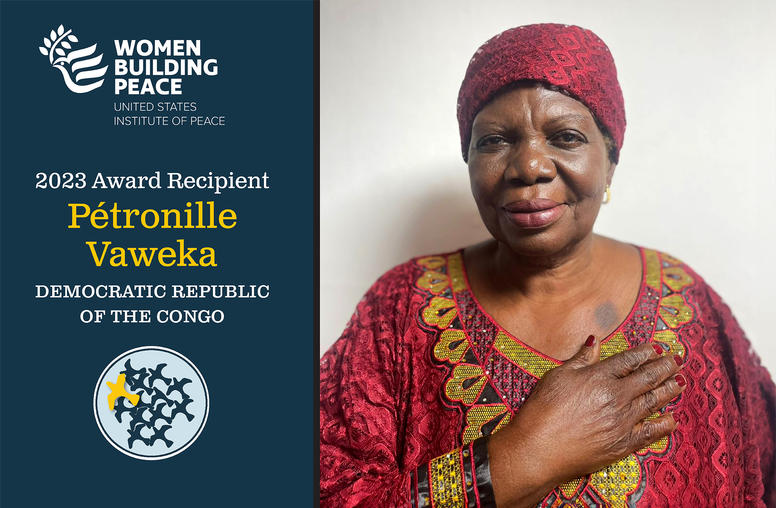Congressional Commission on the Strategic Posture of the United States Issues Final Report
Twelve-Member Bipartisan Group concludes that nuclear dangers can be reduced if U.S. pursues a comprehensive strategy centered on both deterrence and diplomacy. The report says “the threat of nuclear Armageddon has largely receded” but the proliferation of nuclear weapons and fissile materials is dangerously close to a “tipping point.”
FOR IMMEDIATE RELEASE - May 6, 2009
Contact:
Lauren Sucher
+1-202-429-3822
(Washington, D.C.) - The Congressional Commission on the Strategic Posture of The United States, facilitated by the United States Institute of Peace (USIP), today issued its final report to the administration, to the Congress, and to the American people. The report includes a total of nearly 100 findings and recommendations to strengthen America's strategic security. The Chairman of the Commission was former Secretary of Defense William J. Perry; the Vice-Chairman of the Commission was James R. Schlesinger, also a former Secretary of Defense and the first Secretary of Energy.
After nearly a year of deliberation, the Commission agreed that, as long as other nations have nuclear weapons, the U.S. must continue to safeguard its security by maintaining "an appropriately effective nuclear deterrent force." At the same time, the 12 commissioners agreed that "safeguarding U.S. security also requires that the United States should continue to lead international efforts to prevent the proliferation of nuclear weapons, reduce the number of nuclear weapons worldwide, and provide better protection for the residual nuclear forces and fissile material."
"I believe that this is a moment of opportunity, but also urgency," said Secretary Perry. "The opportunity arises from the arrival of a new administration in Washington and the top-down reassessment that must now begin of national security strategy and of the purposes of U.S. nuclear weapons. The opportunity also arises because the Russian government has indicated a readiness to undertake a serious dialogue with the U.S. on strategic issues." Perry added that the urgency arises from "the imminent danger of nuclear terrorism if we pass a tipping point in nuclear proliferation, and because of an accumulation of difficult decisions affecting our nuclear posture."
"The United States Institute of Peace has been privileged to serve as the project facilitator while the Congressional Commission investigated, discussed and crafted its final report," said Richard H. Solomon, President of the Institute. "There is no greater global imperative than that of securing the nuclear peace of the world."
Commission members, coming from a broad spectrum of the American political scene, are:
Dr. William Perry, Commission Chairman, former Secretary of Defense;
Dr. James Schlesinger, Commission Vice-Chairman, former Secretary of Energy and Secretary of Defense;
Dr. John Glenn, former Senator and NASA astronaut;
Dr. John Foster, Director Emeritus of Lawrence Livermore National Laboratory;
Lee Hamilton, former Congressman and Vice Chair of the 9/11 Commission and the Iraq Study Group;
Jim Woolsey, former Director, Central Intelligence Agency;
Dr. Morton Halperin, former Deputy Assistant Secretary of Defense for International Security Affairs;
Dr. Keith Payne, CEO and President, National Institute for Public Policy;
Dr. Harry Cartland, former physicist, Lawrence Livermore National Laboratory;
Dr. Ellen Williams, University of Maryland Distinguished Professor;
Dr. Bruce Tarter, former Director, Lawrence Livermore National Laboratory;
Dr. Fred Ikle, former Director, Arms Control and Disarmament Agency
Congress created the Commission as part of the National Defense Authorization of 2008 and directed that the Commission deliver an interim report to Congress in December 2008. The House Armed Services Committee named six of the Commission's 12 members; the Senate Armed Services Committee named the other six.
Commissioners reached consensus on all issues, with the exception of the question of whether or not the Comprehensive Test Ban Treaty (CTBT) should be ratified. The commissioners offered pro and con positions on that question and agreed on steps that could be taken to enable Senate deliberation, including preparation of a comprehensive net assessment of benefits, costs, and risks.
Among the Commission's key findings and recommendations:
-
The United States should pursue an approach to reduce nuclear dangers that balances U.S. deterrence, arms control, and nonproliferation interests.
-
Nuclear terrorism against the United States and other nations is a very serious threat. This requires a much more concerted international response, one which the United States must lead.
-
The surest way to prevent nuclear terrorism is to deny terrorist acquisition of nuclear weapons or fissile materials.
-
An accelerated campaign to close or secure the world's most vulnerable nuclear sites as quickly as possible should be a top national priority.
-
Substantial stockpile reductions would need to be done bilaterally with the Russians, and at some level of reductions with other nuclear powers.
-
At a time when the United States is considering how to reduce nuclear dangers globally, it is essential that it pursue cooperative, binding measures with others.
-
The United States should pursue a step-by-step approach with Russia on arms control, ensuring there is a successor to the START I nuclear arms agreement before it expires at the end of 2009.
-
The United States could maintain its security while reducing its reliance on nuclear weapons and making further reductions in the size of its stockpile, if this were done while also preserving the resilience and survivability of U.S. strategic forces.
-
The Commission sees both U.S. extended deterrence guarantees to its allies and the global Nuclear Nonproliferation Treaty regime as integral to the achievement of U.S. nonproliferation objectives.
-
The United States should also maintain the goal of the talks on denuclearization of the entire Korean peninsula, and do nothing that seems to accept North Korea's status as a nuclear power.
-
Negotiation and entry into force of a ban on the production of fissile material for weapons purposes would be a valuable addition to the global nonproliferation regime.
-
The United States requires a stockpile of nuclear weapons that is safe, secure, reliable, and credible.
-
The United States should develop and, where appropriate, deploy missile defenses against regional missile threats, and also against limited long-range threats from countries like North Korea and Iran. Defenses against these limited threats should avoid giving Russia or China reason to increase their strategic threats to the United States or its allies.
-
The United States must maintain the six-decade tradition of non-use of nuclear weapons and urge other nuclear states to adhere to it.
The past successes of the United States and its international partners in meeting and reducing nuclear dangers make the Commission more hopeful for the future. The Commission embraces the possibility that over the next decade or two nuclear dangers will be further reduced.
The final report will be available online at 10:30 am on May 6, 2009.

